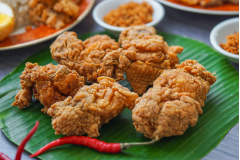焦虑时猛炫“热量炸弹”?你可能会后悔!

When we’re stressed out, many of us turn to junk food for comfort. But new research suggests this strategy may backfire. The study found that in animals, a high-fat diet influences brain chemicals in ways that fuel anxiety. “Everyone knows that these are not healthy foods, but we tend to think about them strictly in terms of a little weight gain,” said lead author Christopher Lowry. “If you understand that they also impact your brain in a way that can promote anxiety, that makes the threats even higher.”
In a previous study, the team found that rats fed a high-fat diet showed increases in neuroinflammation (神经炎症) and anxiety-like behavior.
To better understand what may be driving the fat-anxiety connection, Lowry’s team divided male adolescent rats into two groups: Half got a standard diet of about 11% fat for nine weeks; the others got a high-fat diet of 45% fat. Throughout the study, the researchers collected fecal (排泄物的) samples and assessed the animals’ gut (肠) bacteria. After nine weeks, the animals underwent behavioral tests.
When compared to the control group, the group eating a high-fat diet, not surprisingly, gained weight. But the animals also showed significantly less diversity of gut bacteria. The high-fat diet group also showed higher expression of three genes (tph2, htr1a, and slc6a4) involved in production and signaling of the neurotransmitter serotonin (神经递质血清素), which is associated with stress and anxiety.
Lowry stresses that not all fats are bad, and that healthy fats like those found in fish, olive oil, nuts and seeds can be good for the brain. But his research in animals suggests that exposure to an ultra-high-fat diet, particularly at a young age, could both boost anxiety in the short-term and make the brain more likely to suffer from it in the future.
原创编写 版权所有 侵权必究! 每日更新 个性化阅读 英语飙升!